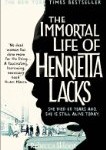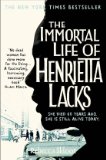I don’t read much non-fiction, but so many people raved about this book that it became impossible to ignore it. Sandy persuaded me to get the audio book version* and I’m so pleased that she did because I think it added an extra dimension to the text – the narration was fantastic and the different accents brought the story to life.
Henrietta Lacks was a poor, black woman who died from cervical cancer in 1951. Shortly before her death a sample of cells was taken from her cervix and then used, without her permission, for scientific research. At the time cell culture was in its infancy and scientists found it very hard to keep cells alive in culture, but for some reason Henrietta’s cells were different – they divided quickly and easily. These cells revolutionised cell research. They became known as the HeLa line and were used by scientists around the world to find cures for a host of different diseases. This book explained how the Lacks family discovered that the cells existed and their search for the truth about how billions of dollars of wealth were created from them without the family receiving a penny.
The book gives a fascinating insight into the life of a family struggling to cope with the loss of their mother, whilst at the same time having to cope with the fact that a part of her lives on in test tubes around the world. I found the initial explanations of events to be gripping, but by disc 6 (out of 10) I was beginning to get a little bored. I felt I knew exactly what was going to happen next and found that things were beginning to be over-explained. The downfall of many non-fiction books is that they include too much unnecessary detail for me and although I appreciate that completeness is sometimes needed I felt that much of the last half of the book could have been left out. I wasn’t interested in the word-for-word transcripts of every phone call that took place between Rebecca Skloot and the family and I also found the detail of what happened to each member of the Lacks family to be unnecessary. I wish that the book had concentrated more on Henrietta and her cells and less on the process of researching a book.
The main benefit of the book is that it raises many important questions about who owns the various parts of our bodies. It is a fantastic discussion starter and I’m sure that almost everyone will find something to enjoy in this book.
The Immortal Life of Henrietta Lacks is an important book and I’m really pleased that Henrietta Lacks is finally receiving the recognition that she deserves, but this book desperately needs an update. I found the ending to be quite abrupt and I would much prefer it to end on a high note, detailing all the wonderful things that are happening to the Lacks family now that this book has been successful.
*Note: The audio version is not available in the UK. I imported a copy from the US.


38 replies on “The Immortal Life of Henrietta Lacks – Rebecca Skloot (Audio Book)”
I can’t comment the audio version because I havent heard it but I want to urge anyone and everyone to read this book, or listen to it or… well… whatever they like. I LOVED this book and think its a story that really, really needs to be read by lots and lots of people.
Glad you liked it Jackie.
Simon, I agree. I think it is important that lots of people know this story. The details are so important that in the end it doesn’t really matter that it isn’t written perfectly. Luckily it seems that this book is getting a lot of publicity and so lots of people will find out about it. 🙂
I have this one on my kindle and will read it in March when my local University and town do it for the community reads. Thank you for the positive review
Helen, I’m sure that you’ll enjoy it and it is lovely to know your community is reading it together – I’m sure you’ll have a wonderful discussion. 🙂
I can’t wait to read this book. I hope to get to it soon. Amazing story.
Vivienne, I hope that you enjoy it 🙂
It does sound like the book needs an update. It sounds interesting and is on my wishlist of books to read at some point. Glad you enjoyed part of it at least 🙂
Amy, The first half is fantastic – I hope you enjoy the second half more than I did 🙂
I have been curious about this book ever since it first started showing up on the blogs. I do want to read it but hope I don’t get bogged down in the end like you did- sometimes non-fiction can be hard to get through.
Jeane, I don’t read much non-fiction for that very reason. I think I have a lower tolerance than most for that sort of thing, but I hope you enjoy it.
I don’t read much non-fiction either, but I have an informal goal of trying to read one a month this year, and this is my plan for March. I’ve heard so many wonderful things about it, so I’m glad to see a fellow fiction-lover still enjoyed it!
Carrie, I doubt I’ll manage to read one non fiction a month, but I wish you good luck with your goal. I prefer to stick to fiction and its lack of concern for completeness!
Also listen to it recently in audiobook and was happy with the format. Although I missed the photos of the paper version, there’s always Google Images. I also felt that the most fascinating part was not, as I was expecting, the life of the family, but the ethics-related questions Skloot brings up and the description of a lab’s day-to-day work
Alex, I didn’t realise that there were photos in the book. I’ll have to find a copy in the library and have a quick look at them.
I wish there had been more exploration of the moral issues. I would have liked more details of other cases where body parts had been used without consent.
Glad you enjoyed it as much as I did, Jackie. 🙂
Teresa, Our booksish tastes are matching up again 🙂
Thanks for the link to the article detailing what is happening with the foundation. I read this last month and was really wondering what came out of that and what was happening. Perhaps when it goes into paperback they will be able add something about this.
Heidi, I really hope that they include an extra chapter when they next reprint it – it would be lovely to end the book on such a high note.
I read the audio of this as well and it was fascinating! It’s amazing how many stories out there never get told without a passionate researcher.
Melissa, or a persistent researcher 😉
This was one of my fav books from the books I’d last year.
If you want another non-fiction recommendation, I just finish Little Princes: One Man’s Promise to Bring Home the Lost Children of Nepal by Conor Grennan, highly recommended and easy to read too. (review will be up this weekend).
Christa, Thanks for the recommendation – I’ll keep an eye out for your review 🙂
I had mixed feelings about this book. I need to go see the updates. Perhaps I’ll end up with a more positive take.
Beth, I can see why you had mixed feelings. I had them a lot, especially in the last half of the book. Reading the updates about how Skloot has helped the family definitely helped me to see the positive side.
I also just finished reading about Henrietta. I agree with most of your review, but I did want to know what happened to Henrietta’s family. I am not so sure her family has ever benefited. Skloot should have mentioned if her book helped the family, I’m guessing it did not. I found the book to be depressing and scary in that we still have no control over what happens to parts of our bodies once they are removed from us.
Elisabeth, I liked knowing some aspects of the family, but the list-like summary at the end did nothing for me.
If you click on the link at the end of my post you’ll see that Skloot has done a lot to help the Lacks family. I hope the full details of what she has achieved will be mentioned in an update to the book at some point.
I loved the audio version as well. Glad you got to experience it Jackie.
Diane, Yes. It was surprisingly cheap to get the audio version from the US – you have much cheaper audio books than we do!
Dying to read this for awhile.. so hope I will have the chance to read it. It’s the sort of non-fiction that will never be boring.
It is also very interesting to know that you listen to the audio book. You don’t do this very often right? 🙂
JoV, No. I don’t get much chance to listen to audios (children running around so I worry about language, but also they are too distracting!) I normally only get to listen to one a month and so make my audio book selection very carefully as the time is too precious to waste on average ones 🙂
I am very very near the end of this and I agree. I wish the focus had been more on Henrettas life and I wish there was more of the science behind her cells instead of all the family stuff. Its almost as if its been dumed down quite abit (IMO) The author has a science background so I’m surprised at that but then it does appeal to the masses and has become a NYT best seller.
Jessica, I would have appreciated much more information about the scientific background too, but I’m a scientist so know that the general population would disagree! I think you’re right – to be a NYT best seller she probably has the science about right 🙁
I look forward to reading your review.
I agree with everything you say, Jackie – the first half was brilliant, but the second half was too much padding for me. And I didn’t like the way the author made herself part of the story – sometimes that works, but not this time.
Lyndsey, I couldn’t agree more! The focus should have remained on the family and the authors presence should have been minimal 🙁 In the end the importance of the message outweighed the poor last half, but it is such a shame it went downhill.
I, too, listened to this one. I thought the narration was quite good and probably wouldn’t have enjoyed the book as much in print. I liked how Skloot blended so many different topics: science, history, memoir, biography. For me, it was a nice balance.
[…] The Immortal Life of Henrietta Lacks – Rebecca Skloot (Audio Book) […]
[…] The Immortal Life of Henrietta Lacks by Rebecca Skloot […]
[…] I’m planning to read the Wellcome Prize shortlist before the winner is announced on the 29th April. The Wellcome Prize celebrates the best new books that engage with some aspect of medicine, health or illness and I’ve had a very good experience with the winners from previous years (including Far From the Tree by Andrew Solomon and The Immortal Life of Henrietta Lacks by Rebecca Skloot) […]